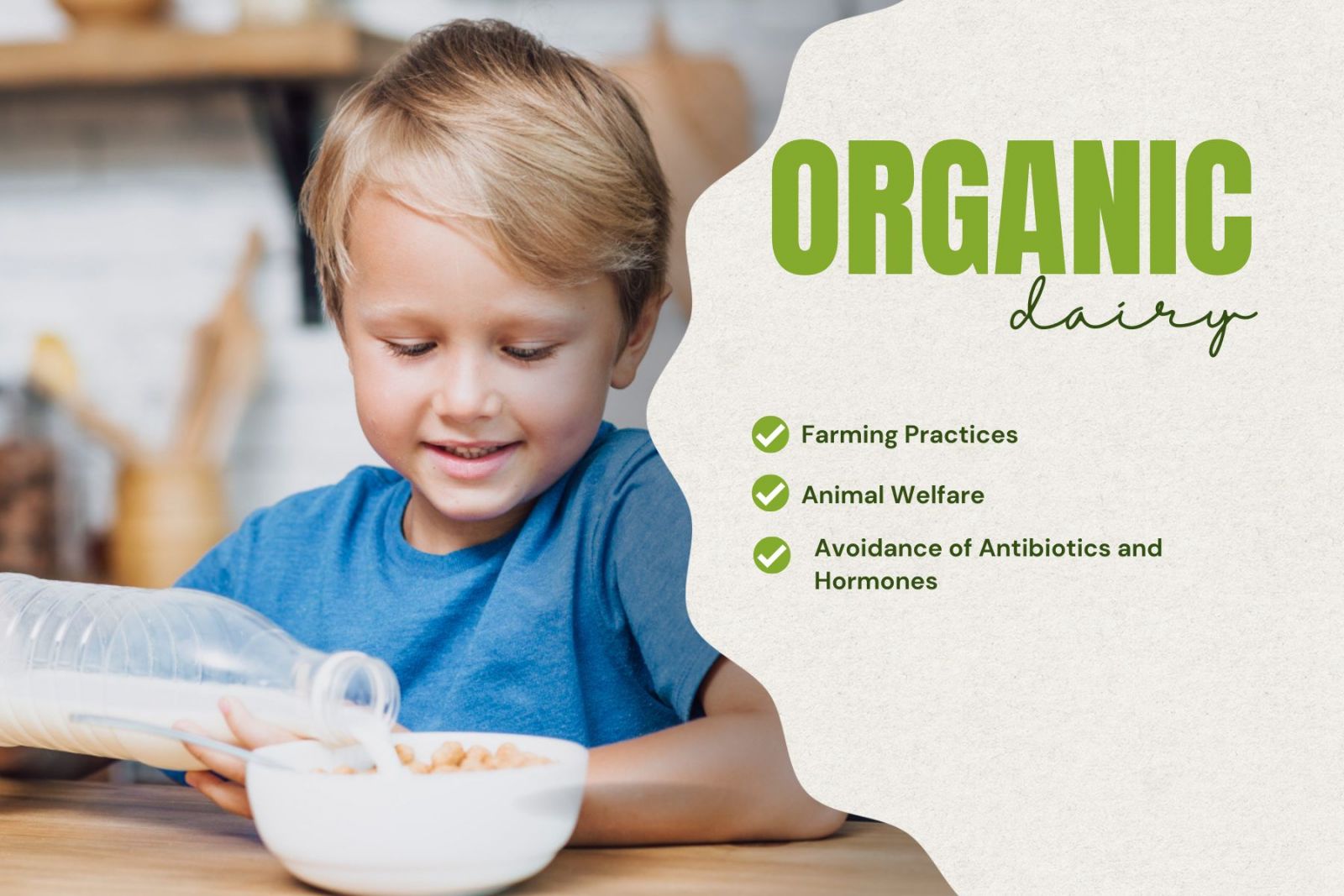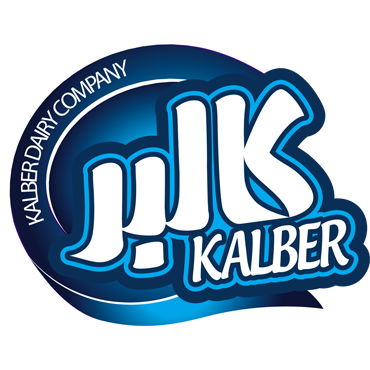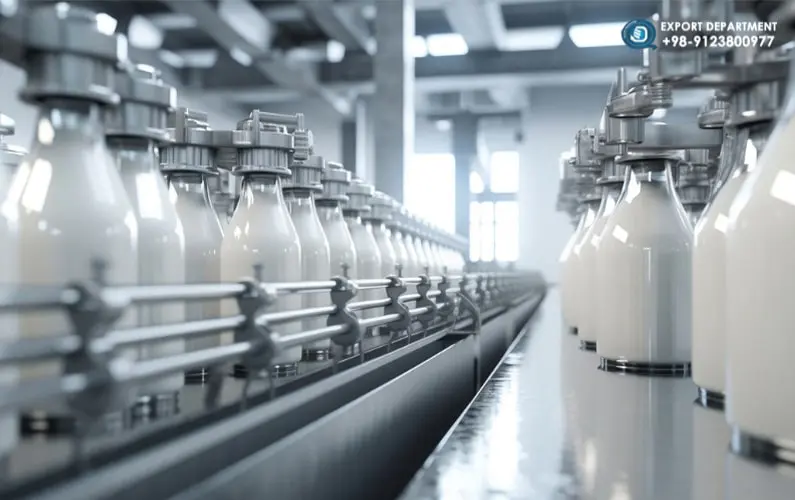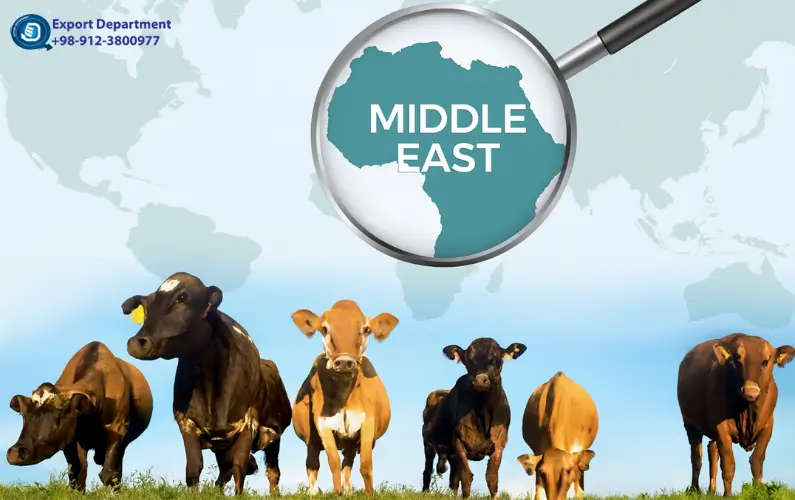Understanding Organic Dairy: Key Differences from Conventional Dairy
Discover the key differences between organic and conventional dairy. Learn about organic dairy’s farming practices, health benefits, animal welfare, and environmental sustainability.
| Table of Contents |
| 1. What is Organic Dairy? |
| 2. How Does Organic Dairy Differ from Conventional Dairy? |
| 3. Why Is Organic Dairy More Expensive? |
| 4. Environmental Benefits of Organic Dairy Farming |
| 5. Nutritional Benefits: Is Organic Dairy Healthier? |
| 6. Commonalities Between Organic and Conventional Dairy |
| 7. Which Should I Choose: Organic or Conventional Dairy? |
| 8. Frequently Asked Questions (FAQs) About Organic Dairy |
| 9. Conclusion: Is Organic Dairy Worth It? |
Organic vs. Conventional Dairy
Organic dairy products have grown in popularity over recent years, with more consumers opting for organic milk, butter, and cheese. But what makes organic dairy different from conventional dairy, and why is it priced higher? This blog will break down the key differences, nutritional benefits, and environmental impact of organic dairy.
What is Organic Dairy?
Organic dairy refers to products from cows raised under organic farming standards. These standards focus on maintaining natural practices like:
- No synthetic pesticides or fertilizers in the feed.
- No antibiotics or growth hormones given to the cows.
- Pasture access for a significant portion of the year.
- Certification by recognized bodies.
How Does Organic Dairy Differ from Conventional Dairy?
1. Farming Practices
Organic dairy farms avoid synthetic chemicals, pesticides, and fertilizers. They also steer clear of genetically modified organisms (GMOs). In contrast, conventional dairy farms often rely on synthetic inputs like chemical fertilizers and GMO feed to boost production.
2. Animal Welfare
Organic dairy cows are required to graze on pasture for part of the year and are treated more humanely compared to conventional dairy cows. In conventional farms, cows may be confined indoors for extended periods and are frequently given growth hormones like rBST to increase milk yield.
3. Use of Antibiotics and Hormones
In organic dairy farming, cows cannot be treated with antibiotics unless they are removed from the organic herd. Conventional dairy farms, however, can use antibiotics and routinely administer growth hormones to boost productivity.
Why Is Organic Dairy More Expensive?
The higher cost of organic dairy is due to several factors. Organic farms require more labor-intensive methods, organic feed is more expensive, and organic farming regulations involve stringent certifications. The emphasis on pasture maintenance and humane treatment also increases production costs.
Environmental Benefits of Organic Dairy Farming
Organic farming practices contribute to sustainability. Organic dairy farms prioritize soil health, crop rotation, and reduced carbon emissions. These farms avoid synthetic fertilizers and pesticides, which helps promote biodiversity and reduces environmental pollution.
Nutritional Benefits: Is Organic Dairy Healthier?
Organic dairy is sometimes said to contain higher levels of beneficial nutrients like omega-3 fatty acids and antioxidants. While some studies suggest minimal nutritional differences between organic and conventional dairy, proponents argue that the absence of synthetic chemicals makes organic dairy a cleaner option.
Commonalities Between Organic and Conventional Dairy
Both organic and conventional dairy products provide consumers with essential nutrients needed for a healthy diet. Whether it’s organic or conventional, dairy offers 16 vital nutrients, including protein, calcium, vitamin A, vitamin B12, and vitamin D. These nutrients play an essential role in maintaining strong bones and overall health, though the levels may vary slightly between the two.

Which Should I Choose: Organic or Conventional Dairy?
In terms of safety, both types of dairy products undergo strict safety standards, despite organic dairy being more regulated. Both are pasteurized—a process that involves heat treatment to eliminate harmful bacteria and extend the product's shelf life.
While organic dairy is generally more expensive, primarily due to the labor-intensive farming practices and organic certification processes, conventional dairy is a more budget-friendly option that still delivers the necessary nutrients.
Ultimately, choosing between organic and conventional dairy comes down to personal preference. Both types meet stringent safety standards and provide key nutrients. While research hints that organic milk might be healthier due to fewer chemicals and antibiotics, the long-term health effects are still being studied.
There’s no definitive "right" or "wrong" choice, but ongoing research may reveal more about the potential health benefits of organic versus conventional dairy in the future.
Frequently Asked Questions (FAQs) About Organic Dairy
1. What qualifies dairy products as organic?
Organic dairy products come from animals raised according to strict organic farming standards. These animals are fed organic feed, are not treated with antibiotics or synthetic hormones, and must have access to the outdoors.
2. Is organic dairy better for health?
Organic dairy is often considered healthier because it contains no synthetic pesticides, hormones, or antibiotics. Some studies suggest that organic milk has higher levels of certain nutrients like omega-3 fatty acids and antioxidants, though the nutritional differences are generally small.
3. What are the environmental benefits of organic dairy farming?
Organic dairy farming promotes environmental sustainability by using practices like crop rotation, avoiding synthetic pesticides, and promoting biodiversity. It also emphasizes animal welfare and reduced carbon emissions by avoiding chemical fertilizers.
4. Why is organic dairy more expensive?
Organic dairy farming requires more labor-intensive methods and higher production costs due to organic feed, pasture maintenance, and adherence to organic certification standards, which contribute to the higher price of organic dairy products.
5. Can organic milk last longer than regular milk?
Organic milk often has a longer shelf life because it is typically ultra-pasteurized to extend its freshness, which is necessary due to the logistics of transporting organic milk from farms to stores.
6. Are organic dairy products better for the animals?
Yes, organic farming standards require that dairy cows are treated more humanely. They must have access to pasture, be fed organic feed, and cannot be given growth hormones or routine antibiotics, promoting better overall animal welfare.
7. Does organic dairy taste different?
Many people claim that organic dairy products have a fresher, richer taste compared to conventional dairy. However, taste differences can also depend on factors like the breed of cow, diet, and the production methods used.
8. Is organic milk free of antibiotics?
Yes, organic milk must come from cows that have never been treated with antibiotics. If a cow in an organic dairy farm becomes ill and requires antibiotics, it must be treated but is then removed from the organic herd.
9. How do I know if a product is truly organic?
Organic dairy products should be certified by recognized bodies such as USDA Organic (in the U.S.) or other regional certifications. Look for the organic seal on the packaging to ensure it meets official organic standards.
10. Is organic dairy better for lactose-intolerant individuals?
Organic dairy products still contain lactose, so they may not be suitable for lactose-intolerant individuals unless they are specifically labeled as lactose-free.
Conclusion: Is Organic Dairy Worth It?
Whether or not organic dairy is worth the extra cost depends on individual priorities. Consumers who prioritize animal welfare, environmental sustainability, and the avoidance of synthetic chemicals are more likely to choose organic dairy. While the nutritional differences may not be significant, the peace of mind that comes with organic certification and the emphasis on more humane and eco-friendly farming practices often justifies the premium price for many buyers.
Read More: Essential Dairy Food Standards



 (2).webp)
.webp)